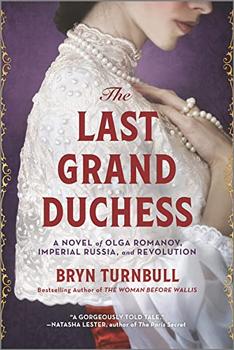Summary | Excerpt | Reading Guide | Reviews | Beyond the Book | Readalikes | Genres & Themes | Author Bio

A Novel of Olga Romanov, Imperial Russia, and Revolution
by Bryn TurnbullPART ONE
1
March 1917
Tsarskoe Selo
Across the room, shrouded in the darkness that had cloaked the palace since the electricity lines were cut days before, Olga's mother pulled a shawl across her shoulders. Candlelight sent dark flames up the cavernous bookshelves that lined the walls, illuminating her weary face.
"Abdicated?" she whispered.
Panic gripped her by the throat, and Olga turned to face the window once more. In the deepening gloom, she fancied she could see the orange glow of bonfires. "I don't understand. In favor of Alexei?" She glanced at Mamma: Alexei's chronic poor health had always made him seem older than his age, but at twelve, he was still very much a child, and far too young to take on the heavy burden of ruling.
Standing in front of the tsarina, Major General Resin, the commander who'd taken charge of the garrison of troops that protected Olga's family, cleared his throat. "No, Your Majesty. It's more complicated than that. We're still receiving information from the front, but it seems His Imperial Highness was most insistent on the matter. He offered the crown to his brother, Grand Duke Mikhail, but the grand duke refused it. The Duma has formed a provisional government to determine what will happen next, but as I said, we will learn more once His Majesty returns."
Olga turned her attention back to Mamma, shutting out the continued rattle of gunfire—no closer to the palace walls, but no farther away, either. Having spent the last several weeks nursing her siblings through a fierce bout of German measles, Olga had not had the time nor the energy to keep abreast of political developments, but she'd heard enough to know that unrest had been boiling in the capital. Protests in the coal plants; riots in bread lines. Rolling blackouts, hitting tenements and palaces alike; rallies and calls for change, growing ever louder as the war against the Central Powers continued to leech provisions from households and businesses.
But abdication?
From within the white folds of the Red Cross veil she'd worn since the start of the war, Mamma's face fell, her pale eyes darting around the room. "I don't understand," she said. "I simply don't understand."
She reached out a thin hand, waving her fingers insistently; recognizing the movement, Olga stepped forward and took it, searching for a logical route through her own confusion. She could hear a buzzing in her head: an insistent roar, the sound of surf crashing against the hull of a ship. With Papa's abdication, the situation had become everything she'd feared, the sickening finality in the word itself enough to keep it from passing her lips: revolution.
She squeezed Mamma's hand, watching as Resin's fingers tightened on the flat brim of his cap. "Where is Papa?"
"He's coming here, Grand Duchess," replied Resin, "but in the opinion of the Provisional Government, the palace is not the safest place—not for His Imperial Majesty, and not for you, either. I'm afraid they can no longer guarantee your welfare."
Mamma looked up sharply. "We have three hundred loyal Cossacks at the gate—the finest soldiers this country has ever produced," she said, sounding for a moment like her old, fierce self. "They're loyal to my husband. I fail to see the danger."
Resin shifted his weight from one foot to the other. "With all due respect, Your Majesty, Minister Rodzianko disagrees. The barracks in Tsarskoe Selo have begun to riot; they're singing the 'Marseillaise' as we speak."
Excerpted from The Last Grand Duchess by Bryn Turnbull. Copyright © 2022 by Bryn Turnbull. Excerpted by permission of Mira. All rights reserved. No part of this excerpt may be reproduced or reprinted without permission in writing from the publisher.
A truly good book teaches me better than to read it...
Click Here to find out who said this, as well as discovering other famous literary quotes!
Your guide toexceptional books
BookBrowse seeks out and recommends the best in contemporary fiction and nonfiction—books that not only engage and entertain but also deepen our understanding of ourselves and the world around us.